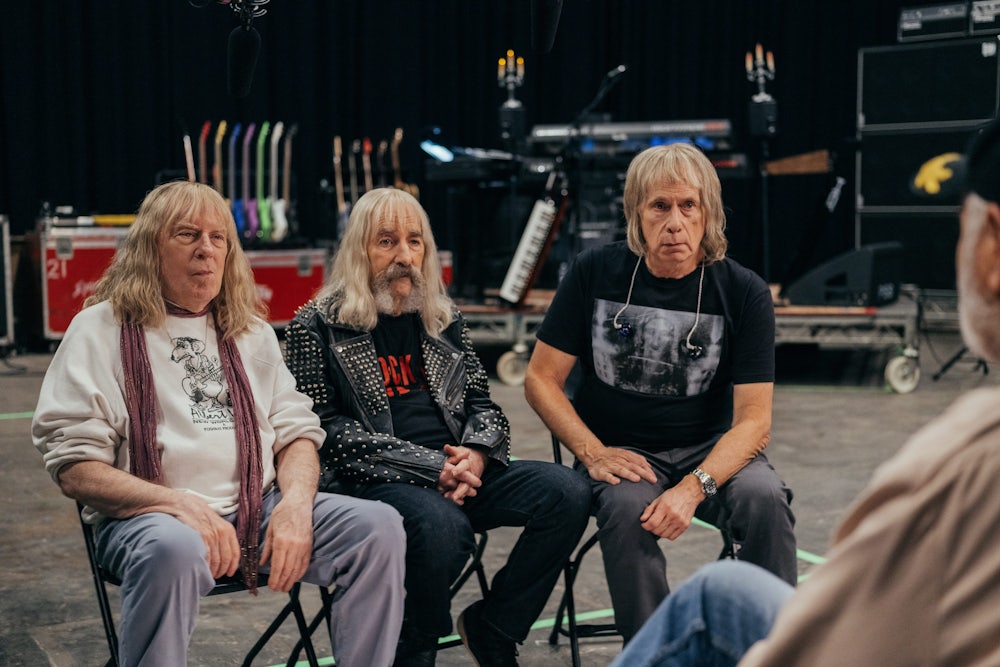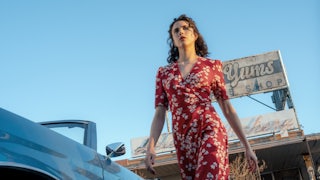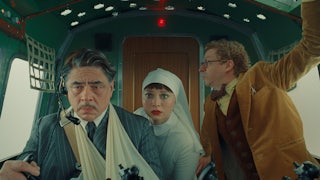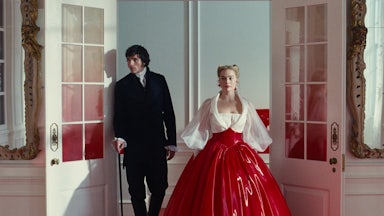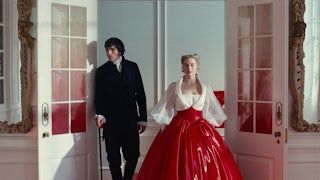Two household-name Brit-rock stalwarts, both alike in indignity, in 2025, where we lay our scene. Grudges don’t get more ancient—nor bandmates more star-cross’d—than in the strange cases of Oasis and Spinal Tap, both of whom are currently in the midst of long-awaited reformations; the latter’s new showcase, Spinal Tap II: The End Continues, arrives as Manchester’s finest are touring the globe. The fact that one of these two groups is technically fictional scarcely undermines the symmetry of the situation.
There is a story that Liam Gallagher once walked out of a Spinal Tap concert at Carnegie Hall after learning that the heroic trio onstage were actually comedians taking the piss. He felt betrayed, but in a way, his shock was a compliment to Christopher Guest, Michael McKean, and Harry Shearer—a.k.a. Nigel Tufnel, David St. Hubbins, and Derek Smalls—not only for their comic chops but for the sleight-of-hand being practiced on their respective fretboards. Since 1984, the members of Spinal Tap have written their own songs, sung their own vocals, and played their own instruments. In the process, they’ve kept our collective disbelief suspended, in the rafters, right alongside an 18-inch replica of Stonehenge. “Authenticity,” said no less an authority than Bruce Springsteen, “is a house of mirrors.” Or, to paraphrase “Wonderwall”: What’s a real band anyway?
Of course, the conceptual coup of This Is Spinal Tap was that its subjects were not only ersatz rock stars but genuine phonies: feckless, opportunistic shape-shifters in search of a gimmick that could stick. In an early MTV moment when hitmakers and their producers alike fretted anxiously about the relationship between image and musicianship, Spinal Tap’s picaresque backstory, tracing a less-than-illustrious arc from countercultural warriors to devil-worshippers-of-convenience, landed squarely as an act of trenchant satire. The film was extraordinarily well made, melding credible backstage vérité with songs that split the difference between parody and paydirt.
During his salad days, McKean had freelanced as a guitarist for the well-known baroque popsters the Left Banke, and his skills were on full display. On the early-Beatles pastiche “Gimme Some Money,” McKean adopts a Lennon-ish sneer to convey that you can, in fact, buy him love (“I’m looking for pound notes, loose change, bad checks, anything”); the punch line of the sitar-driven “Listen (To What the Flower People Say”), meanwhile, is that the singer’s actual peace-and-love–message never gets clarified. Best of all: the legit riff monster “Tonight I’m Gonna Rock You Tonight,” which distilled several decades’ worth of cheerful, cock-rock misogyny into the deathless couplet: “You’re too young / and I’m too well hung.” Future Kennedy Center honoree Gene Simmons couldn’t have said it better.
There aren’t many movies funnier, line for line, than This Is Spinal Tap; its best moments remain spontaneous—and, with respect to Liam, pretty bloody convincing—40 years later. The oft-quoted observation about the permeable boundary separating stupid from clever doubles nicely (and quite intentionally) as an explication of the film’s particular off-the-cuff genius—the way it locates its eloquence in a set of malapropisms and non sequiturs. The line dividing the (ig)noble showbiz tradition of combative, booze-fueled sound bites and the sort of synapse-fast improv practiced by the Guest-McKean-Shearer troika is long, and fine enough to snort off of a greenroom table; a supercut of the most knuckleheaded exchanges between Nigel and David, juxtaposed with footage of the Gallaghers gone wild—or, really, with any of the best parts of Cocksucker Blues or The Decline of Western Civilization or Some Kind of Monster—would prove instructive. At a certain point, imitation transcends contempt (and flattery) to become its own gold standard.
With this in mind, This Is Spinal Tap plays less these days like a cautionary tale about the perils of selling out than like a how-to manual for aspiring guitar-slingers, especially with rock and roll itself in a state of crisis. (Imagine Dragons? It’s easy if you try.) Like nature, stadiums abhor a vacuum; the 50,000 Torontonians who joined me recently in singing along to “Don’t Look Back in Anger” can testify to not only the potency of cheap music (a dig from one Noel to another) but a desire to reanimate the dinosaurs of the past, Jurassic Park–style. The self-reflexive premise that Spinal Tap has aged into twenty-first-century respectability—and hot-ticket status—gives the long-awaited (and in some corners, deeply dreaded) Spinal Tap II: The End Continues its necessary pretense of a plot line, and carte blanche to take its predecessors’ best-running jokes on a well-earned victory lap.
Given the timing of their respective reunions, it’s a shame that Oasis and Spinal Tap never cross paths in The End Continues. The film—directed, like the original, by Rob Reiner, who also appears on-screen as behatted muckracker rockumentarian Marty DiBergi—features a vast array of A-listers down to clown with its protagonists. This clout-chasing is not necessarily a good thing, however. The absence of any recognizable celebrities in This Is Spinal Tap contributed smartly to its underdog charm and stranger-than-fiction sensibility; the film’s leads—then merely respected comedians not yet fully mainstreamed by Saturday Night Live—disappeared so fully into their roles that it would have been counterintuitive to surround them with legitimate superstars. Other than Reiner, who’d starred on All in the Family, the biggest name in the cast was probably Billy Crystal, glimpsed briefly in chalk-faced street performer drag (“Mime is money”).
The terms of the masquerade have changed significantly in the intervening years, and The End Continues unfolds, as per the vast majority of twenty-first-century legacy sequels, as an inventory of affectionate, aura-farming cameos, including from knights of the platinum realm Paul McCartney and Elton John, both of whom have been featured heavily in the movie’s marketing materials. The idea is that Sirs Paul and Elton are on hand to help Tap prepare for a spectacular, career-spanning concert in the Big Easy—a one-night-only deal arranged despite their mutual enmity and threaded through a loophole in the lifetime contract they’d previously signed with their cricket-bat-wielding manager Ian Faith (who does not appear, since actor Tony Hendra, one of the original film’s MVPs, died in 2021). Also on hand: Amir “Questlove” Thompson, who bigs-up the band’s legendary status while declining to step behind the drum kit, lest he become just another urban legend like so many vomit-choking, spontaneously combusting Spinal Tap timekeepers before him.
That The End Continues keeps going back to the primal scene for gags is fair enough: It’s rich terrain. There are so many callbacks, though, that the movie starts to resemble a feedback loop—a recursive structure that not only drains the first movie’s batteries but exposes the basic lack of urgency at the core of this follow-up. Marty DiBergi, it seems, needs closure, and maybe for somebody to give him some money as well. OK, but what’s Reiner’s excuse? Instead of resurrecting Spinal Tap to stick it to a music industry currently beholden to algorithms and fanatical stans, the filmmakers duly name-check a few present-tense phenomena—K-Pop, TikTok, #MeToo—while eschewing anything like a critical perspective.
If the joke is supposed to be that these septuagenarian-plus characters are too solipsistic and set in their ways to really acknowledge the world around them, it unfortunately boomerangs back on their creators, who seem checked out to the point that their practiced three-way interplay, at its best a thing of beauty, is mostly for naught. In This Is Spinal Tap, the battle of wills between Nigel and David for artistic control of the band was not only amusing but dramatically legible. Here, the reasons for the duo’s latest falling-out are withheld for so long that the revelation can’t possibly meet our expectations (it doesn’t). The whole thing is also weirdly low-energy from start to finish. Whether Reiner and his editors simply didn’t have enough good takes to choose from or fumbled the assembly is hard to say, but there’s no shape to the proceedings—no sense of momentum or mounting suspense as the show draws nearer. In Guest’s wonderful A Mighty Wind, the mystery of whether or not the old folkies played by Eugene Levy and Catherine O’Hara would finally kiss and make up onstage was yoked to larger currents of Boomer-era angst and regret. Leaving aside the tender emotions evoked by seeing beloved actors in their dotage (Shearer is 81), it never seems like anything is at stake.
For all its faults as a comedy—not being very funny chief among them—there is still a level on which The End Continues is compelling, and even beguiling. The pleasure of watching veteran performers playing together, in the studio and onstage, is real, and it cuts through the feebleness of the routines about cheese shops and glue museums. In fact, it almost makes one wish that Spinal Tap and its handlers had forgotten about exploding drummers and Elton John and Stonehenge and opted instead to toss a real curveball at their audience: a conventional, behind-the-scenes documentary about McKean, Guest, and Shearer preparing to perform a Spinal Tap concert in character. Such a setup would be fascinating and inherently prone to plenty of truth-and-fiction slippage, with built-in shivers of nostalgia and camaraderie; it could function, conceptually, as a true B-side to This Is Spinal Tap (shades of Derek Smalls’s experimental “jazz odyssey”) and avoid the forced, desultory vibes on display here. This Is Spinal Tap was vicious in its way, but there was affection in it, with a robust and persuasive ratio of passion to pastiche. The End Continues feints at rich, elegiac emotions but never quite accesses them. To quote yet another venerable Englishman, a bad cover version of love is not the real thing.
